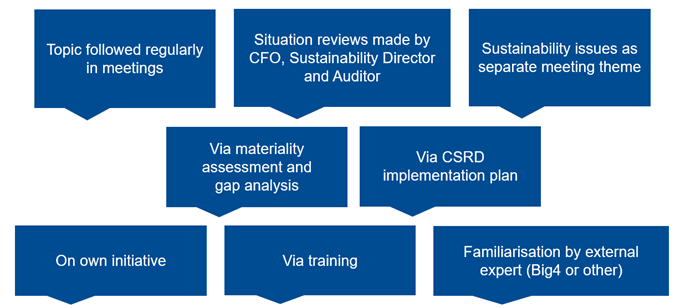6. Audit committees have familiarised themselves with the new regulations
One member of the audit committee shall have expertise in accounting or auditing or both. According to the rationale of the government proposal, audit committee members as a whole shall have expertise relevant to the company’s field of business. The members of the audit committee are obliged to identify the legislation related to their task, as well as lower-level statutes, regulations and instructions. According to the proposed amendment to the Accounting Act, the sustainability report must include a description of the expertise and skills of the board of directors and the chief executive officer in relation to sustainability matters.1
In the first question of the survey, the FIN-FSA asked how audit committees have familiarised themselves with the upcoming regulations on sustainability reporting (e.g. CSRD, ESRS).
Figure 6. Examples of responses to question 1

The responses revealed that all audit committees are aware of the new regulations. The regulations have been followed by most of the companies’ audit committees. At their meetings, around half of the audit committees have received a regulatory overview from executive management and/or the auditor. According to several responses, sustainability matters have regularly been on the agenda of audit committee meetings.
The content of audit committee meetings was described, among other things, as including presentations and discussions covering the content of the CSRD and the ESRS. The audit committees have also been presented with the key differences compared with the current regulations and the company’s current corporate responsibility reporting. One respondent stated that a CSRD implementation plan and the most significant practical challenges in the implementation of reporting have also been discussed. The need for changes to the charters of the board of directors and committees, as well as to the annual work plan have also been discussed.
Several audit committees reported that they had familiarised themselves with the upcoming regulations through sustainability reporting implementation projects. Plans for implementation projects have been presented to audit committees, and the committees have regularly monitored the progress of the projects. The responses also mentioned that the company “prepared a materiality assessment, which is also available for the audit committee, based on the 2022 corporate responsibility” and “when conducting the materiality assessment, the members of the board of directors also participated in interviews”.
Multiple sustainability reporting training events have already been arranged for some audit committees, and others have planned to arrange training events. One respondent stated that the audit committee and the board of directors have participated in two different training events arranged by an audit firm on the sustainability reporting regulations and the upcoming changes due to the corporate sustainability reporting directive. In addition, separate ESG training has been arranged for the board of directors and the audit committee. In another company, training on the new regulations by an external expert is being arranged for the board of directors, board committees and management. Where necessary, further training will be provided internally and/or externally to deepen expertise.
Members of audit committees have also received information via their other positions of responsibility. The responses stated that “the members of the audit committee work in positions of responsibility for several companies covered by corporate responsibility reporting requirements, which gives them multi-channel visibility into the reporting and its requirements” and “some of the members of the audit committee work in the audit committees of several listed companies, which contributes to the accumulation of knowledge about future changes and what is required to prepare for them”. In addition, audit committee members have also familiarised themselves with sustainability reporting independently.
According to the understanding obtained by the FIN-FSA, audit committees have familiarised themselves with the new regulations. Sustainability reporting standards are new, complex, and wide-ranging. Experience of other frameworks provides a good foundation, but the new regulatory framework is, however, significantly different. To be able to apply the information requirements correctly in the companies, also the audit committees must have a sufficiently in-depth understanding of the CSRD and especially of the ESRS.
1 Government proposal 20/2023 vp, p. 46 (Provision-specific justifications) and Act on the Amendment the Accounting Act, chapter 7, section 6. (in Finnish)